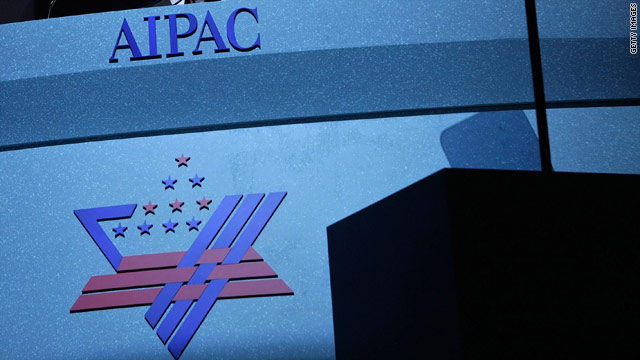The 2013 American Israel Public Affairs Committee (AIPAC) Policy Conference wasn’t quite the same show of arrogant power that it usually is. There seems to have been a note of unusual concern among the 13,000 or so assembled activists. And those concerns echo some of what AIPAC’s detractors have been saying for some time.
The tone was set by AIPAC’s president, Michael Kassen at the beginning of the conference. In what Ha’aretz reporter Chemi Shalev described as “… an uncharacteristic ‘adapt or die’ alarm to the American Jewish community,” Kassen warned of “the growing allure of isolationism among our new leaders”, which would include an aversion to difficult foreign policy issues…like Israel.
Kassen urged the AIPAC activists to expand the base from its overwhelmingly Jewish one, and highlighted the participation of representatives from the African-American and Latino communities in the conference. Yet, despite this outreach, The Forward’s Natan Guttman reports that “…a look at the audience made clear that AIPAC is still largely an organization made up of white Jewish activists.”
There’s more here. Orthodox Jews are disproportionately represented at AIPAC. The Orthodox community represents around 15% of all US Jews. Support among non-orthodox Jews has been dwindling in a hurry, and despite intense efforts by AIPAC to reach out to younger Jews, the crowd is heavily skewed toward grey hair. Guttman also reports that an AIPAC official he spoke to rejected the idea that AIPAC had lost many liberal Jews to the more dovish pro-Israel group J Street by saying that “…if anything, liberal activists are turning away from the issue of Israel altogether and are not seeking a different kind of political approach.”
What AIPAC seems to be facing is the fact that its base, while very active and willing to mobilize considerable wealth as well as time and energy to support the AIPAC agenda, is aging and increasingly out of touch with most Americans. This is something commentators like myself, MJ Rosenberg and groups like Jewish Voice for Peace have been contending for quite some time. And this is only the tip of the iceberg of AIPAC’s problems.
As reported by Adam Horowitz, a recent NBC News/Wall Street Journal poll showed American support for Israel as opposed to the Palestinians (who got 13%) at 45%, that 55% of Americans believe the United States should treat Israel and the Palestinians as equals, and 69% do not believe Israel and the Palestinians can reach a peace agreement. This demonstrates what the authors of the famed book The Israel Lobby, John Mearsheimer and Stephen Walt, have repeatedly stated: Americans do support Israel, but do not believe it should hold a place any more special than other US allies.
None of this is lost on AIPAC, and it was reflected, to some extent, in Kassen’s statements about Congress, where he expressed concern that many younger Congress members have a “different association” with Israel. But it doesn’t end there. The battle over Chuck Hagel’s confirmation as Secretary of Defense is also casting a shadow on AIPAC, perhaps with some permanent ramifications.
Although AIPAC wisely stayed out of the fight, that didn’t prevent the entire episode from becoming a shining example of just how strong an impact the pro-Israel lobby has on Congress. It seeped deeply into popular culture, with prominent comedian and talk show host Bill Maher openly declaring that “Based on every statement I’ve heard from every Republican in the last two years, the Israelis are controlling our government.” And Saturday Night Live may have decided not to air a skit lampooning the extent to which the Senators questioning Hagel were beholden to the Israel Lobby, but it found a bright new life on YouTube.
The more extreme groups that took on Hagel are heavily tilted toward the Republican Party, and they, in the 2012 election, tried very hard to win Jewish votes for the GOP by portraying it as the “only pro-Israel party.” They failed mostly because very few Jews actually vote based on Israel. But that polarization is undermining one of AIPAC’s major strengths, its bipartisan reach, by alienating more and more liberals and Democrats in general from Israel advocacy.
Finally, many reports from across the political spectrum have noted that AIPAC’s conference this year had a rather thin agenda. The focus was on Iran, and to a lesser extent, trying to protect aid to Israel from both the current sequester and future budget cuts. These are responsive issues — reactions to perceived threats. The conference offered scant vision of a better future for Israel, as it completely ignored the Palestinians. To some extent, one might ascribe this to Israel presently being in a state of flux without a new governing coalition. But it actually is more reflective of Israel’s own lack of interest in peace these days. And the idea of simply managing the conflict is a tough message to sell.
These aren’t new problems for AIPAC, and they’re not going away any time soon. The organization itself has taken note of them, but whether or not they will be able to deal with them is an open question. AIPAC is certainly resourceful, but the simple fact is, the playing field is changing. Americans have major economic concerns, and the entire Middle East is stirring or storming. Israel’s behavior in recent years has been more brazen and the reality of its routine violations of Palestinian human rights and its permanent denial of their civil rights has reached the awareness of more Americans — Jewish and otherwise — than ever before.
The “special relationship” has always been an AIPAC-invented fiction that comes to life because of political, not popular, pressures. It has been the shaky foundation of US policy toward Israel and much of the Middle East since the end of the Cold War and the concomitant diminishment of Israel as a strategic asset to the US. In a time where the US populace is continuing to face a level of economic stress it has not witnessed since the Great Depression, the special relationship façade will be even harder to maintain. And AIPAC is nervous, because they know it.






The American congress is for sale–in pieces. Somebody bought the Middle East piece and gave it to the Israelis, for godsake. Now it seems increasingly this phenomenon is being discussed as if it does not exist, a figment of imagination. There is a stranglehold still on every major American institution, news, academia, entertainment, etc., in favor of the “Jewish” state. It has cost the U.S. much in terms of money, lives, and international crediblity–where we are viewed as the running dogs of Zionism, justly. Israel is not the friend of he American people, only its corrupt political class and the institutions this class inhabits and dominates.